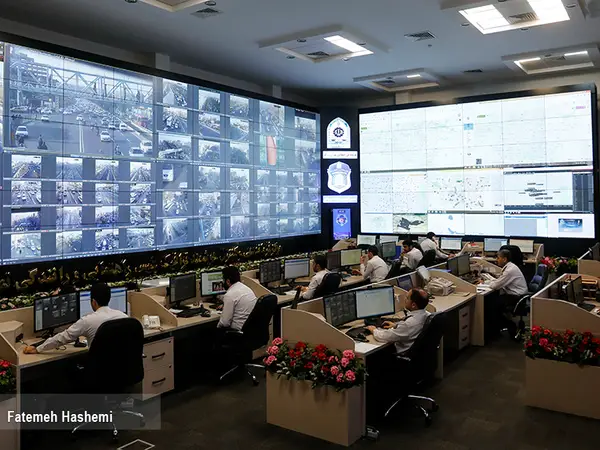While countless Iranian women are appearing in public without hijab, the Islamic Republic is installing cameras around cities to rein in the growing act of civil disobedience.
The head of the traffic police of the capital, Tehran, said on Sunday that "cameras installed for recording traffic violations also record cases of women removing hijab.”
Second brigadier general Mohammad-Hossein Hamidi told Tasnim news agency, affiliated with the Revolutionary Guards, that "all the (surveillance) systems across the city have multi-purpose operations and store all kinds of information”.
He did not provide details about the data recorded by the cameras but said that although the surveillance cameras have been installed by the municipality, they have different data banks from which any government office or organization can extract information relevant to them.
“The traffic police use the traffic data from these cameras, and other departments collect the information they need," he said, without elaborating to which institutions and organizations these departments belong.
However, last year, hacktivist group Black Reward found access to databanks of Fars News Agency, another media outlet affiliated with the IRGC. The hack revealed that the regime has begun collecting information about street protests from footage of CCTV cameras installed throughout the country.
Several lawmakers and hijab enforcement officials had talked about the use of cameras in public places and thoroughfares to identify and penalize unveiled women, but this is the first time a police commander has admitted that traffic cameras are recording other sorts of data on people.
According to a Saturday statement by the police, the move is aimed at “preventing resistance against the hijab law,” adding that such resistance against the regime’s strict Islamic dress code tarnishes Iran's “spiritual image” and spreads insecurity.
Meanwhile, Ahmad-Reza Radan, the chief commander of Iran’s police forces, said that the forces under his command will use advanced technology and equipment to identify people who do not observe the mandatory hijab in public places as of next Saturday. Women and girls who do not wear scarves in "public places, cars or commercial centers" will be prosecuted, he added.
The uprising that was sparked by the death in police custody of 22-year-old Mahsa Amini has made it increasingly difficult to enforce the mandatory Islamic dress code. Appearing in public without a full veil has become a common sight even in small and more conservative towns. Since the beginning of the ‘Women, Life, Liberty’ movement in September last year, thousands of girls and women have set fire to their headscarves in a symbolic move and voiced opposition to compulsory hijab.
Earlier in April, Iran’s ruler Ali Khamenei threw his weight behind the hardliners who have been pushing for new measures to enforce the mandatory hijab laws, saying that “hijab is a restriction based on Sharia (Islamic law) and the constitution.” Khamenei’s assertion that flouting hijab is “religiously and politically haram” has emboldened officials for stricter measures. In a bid to deter the droves of women rebelling against hijab, the regime has also embarked on public humiliation tactics, such as placing officers in Tehran subway to prevent women without the hijab from entering.
It has not only emboldened officials but triggered a wave of civilian actions as the public takes the law into their own hands, seen last week when a mother and daughter were attacked with yogurt while out shopping.
The Islamic Republic, founded in 1979, is the only Muslim country other than Taliban ruled Afghanistan with such a strict interpretation of hijab and nationwide coercive measures for its observance, while Islam is the official religion in 26 countries in Asia, sub-Saharan Africa, North Africa, and the Middle East.
On Sunday, firebrand mouthpiece of the Supreme Leader, Hossein Shariatmadari, the editor of the flagship hardliner newspaper Kayhan, compared hijabless women to "drug addicts and drug dealers" who should be "seriously dealt with”.
